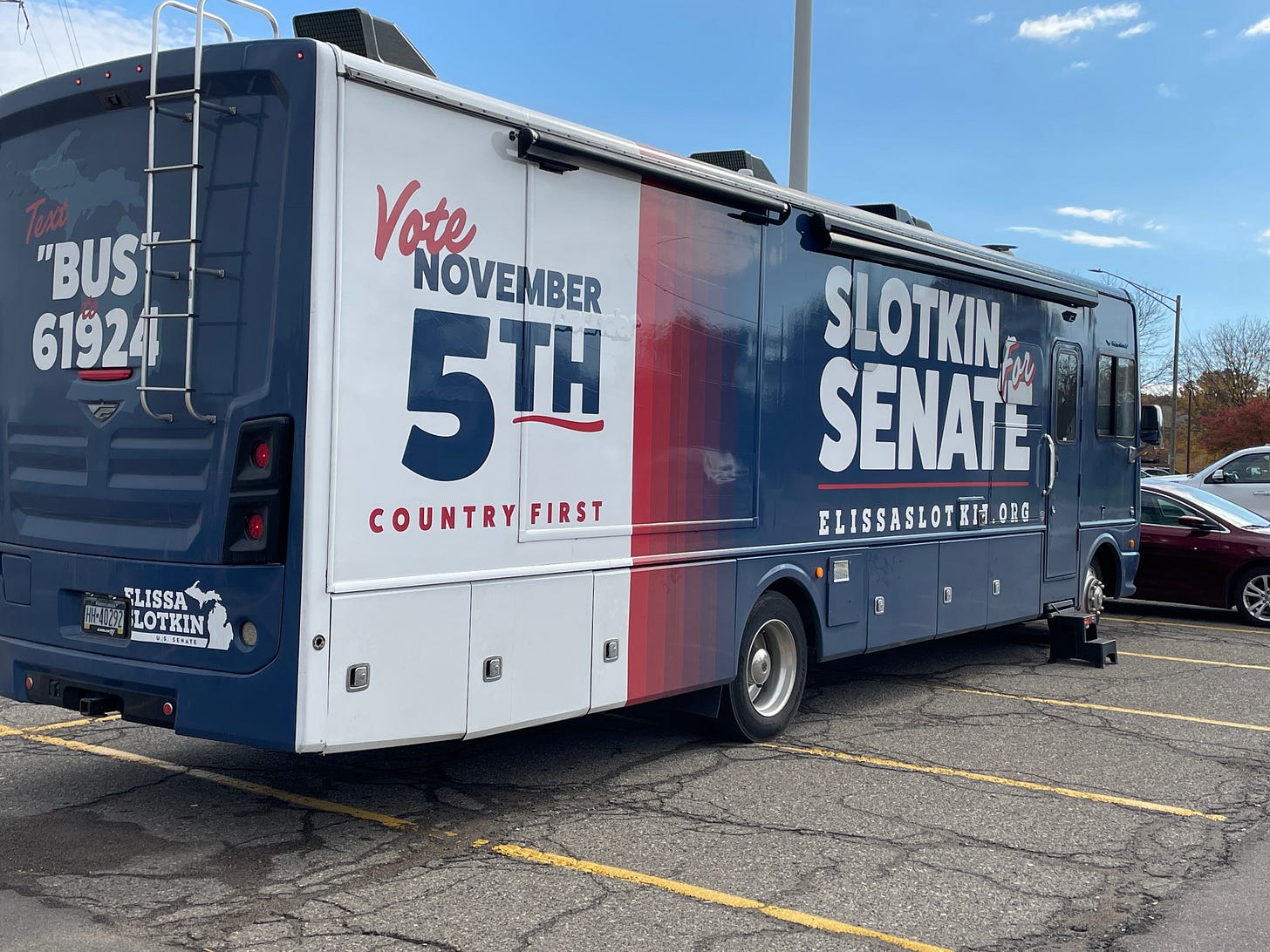And Here We Go: It's Election Day
No predictions from me. Just some observations and a little context about what's at stake.
Good morning, Substack subscribers and my fellow Americans. It’s Election Day.
They’re calling this the most consequential election of our lifetimes. Given the choice, I’m hard-pressed to disagree.
My apologies for the radio silence lately. I’d intended to post more frequently over these past few months. Covering the election has turned out to be a much bigger preoccupation than I ever imagined.
That may sound strange, but back when it was Joe Biden v. Donald Trump, I assumed I wouldn’t have a lot to add to the conversation. Then Kamala Harris became the Democratic nominee and the race suddenly took on a whole new look -- more competitive, and more substantive too.
You might be wondering what I think is going to happen. The honest answer is that I don’t know.
Harris speaks at a rally in Ann Arbor, Michigan just before Election Day. Forgive my poor photography skills. It’s the best I could do with my iPhone.
The polls are close, obviously. The forecasting models all have the election as a toss-up.
I’ve seen lots of recent signs lately that lead me to think Harris is in a strong position. That includes the same public opinion data and reporting that many of you have been reading and processing. It also includes what I’ve been picking up in Michigan, from leaders and organizers and canvassers -- and with my own eyes as well.
As you doubtless know, Michigan is one of seven closely contested states that will likely determine who wins. If Harris can win here, she’s in good shape.
But it’s hard to feel confident about the outcome given how Trump defied expectations to win the White House in 2016 and then very nearly did it again in 2020. It could easily happen this year too. There’s just no way to know.
So what can I tell you?
For starters, I can give you a sense of how the race in Michigan is actually shaping up. And the place to start is with a feature-length article about Elissa Slotkin that appeared just a few days ago, based on reporting scattered over several weeks.
Slotkin is a House Democrat running for an open Senate seat, one that will help determine who controls the chamber. The article is nominally about her, her opponent and the issues in their race. But if you read it, you’ll see that the dynamics of the Senate campaign look a lot like the dynamics of the Harris-Trump campaign.
I.e., the feature has as much to say about Harris’s chances as it does Slotkin’s.
Last week I also published an article about women who support Harris, based in part on what I picked up while writing the Slotkin article. As a voting block, these women are as energized, angry and determined as any I’ve encountered in my years of covering American politics.
There may even be a substantial number of “secret” Harris voters out there — i.e., women who are voting for Harris but not saying so to their partners and spouses. Have you heard about the bathroom sticker campaign? That’s part of the phenomenon.
The Slotkin campaign bus, during a swing through some communities south of Detroit last month.
If Harris ends up winning -- and, again, that’s an “if” -- I think her off-the-charts support among women will be a huge reason why.
I’ve also been writing about some of the policy stakes in this election -- like the future of the Affordable Care Act and efforts to reduce the price of prescription drugs, and the fate of the auto industry and the role of electric vehicles.
The latter obviously matters a lot more in places like Michigan, but for reasons I explain it’s also a larger battle about who really cares about — and will fight for — working-class Americans. That’s at the core of the battle between Harris and Trump.
But the most intriguing proposal in this campaign may be one that Harris unveiled a few weeks ago, during her appearance on “The View.” It’s a proposal to have Medicare start covering part of the cost of long-term care at home for seniors and people with disabilities.
It’s a genuinely novel idea, at least in the context of presidential politics, and it has the potential to be truly life-changing. If you or a family member has ever had to deal with long-term care issues, you’ll know why.
The proposal got very little attention in the media. But it got a pretty big reaction from everyday Americans, at least based on the responses I got when I posted a link to my article on social media.
With my apologies, that’s it for now. I am writing this late in the evening and I have a long day ahead. My hope is to meet canvassers and voters and maybe a few candidates from across Southeast Michigan tomorrow, in order to get a sense of what’s happening so I can write about it after the counting is done. Whenever that turns out to be.
Until then, sit tight. Be well. And if you haven’t voted yet, make sure to do so today!
How we greeted Trick-or-Treaters at our house this year






